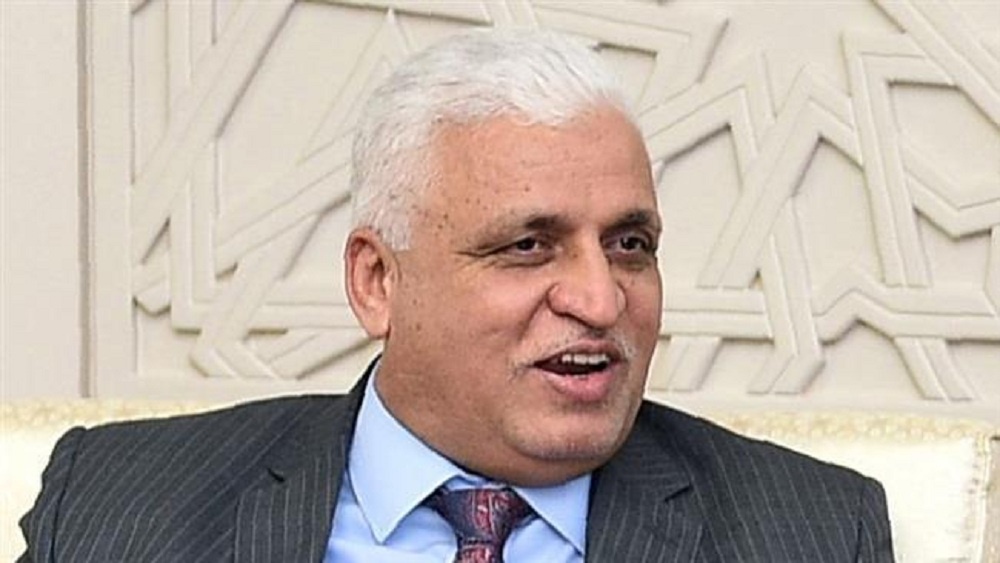The United States sanctioned Iraqi Popular Mobilization Committee chairman and former Iraqi National Security Advisor Falih Al-Fayyadh on Jan. 8 for his alleged connection to grave human-rights abuses. In a statement, the U.S. Department of the Treasury disclosed that throughout the October 2019 protests that swept Iraq, “Iran-aligned elements of the PMC attacked civilians demonstrating against corruption, unemployment, economic stagnation and Iranian interference in Iraq’s domestic affairs.”
According to the Treasury Department’s designation, Al-Fayyadh was involved with a “crisis cell” made up mostly of Popular Mobilization Forces (PMF) militia leaders heavily supported by Iran’s Islamic Revolutionary Guards Corps-Quds Force (IRGC-QF). The Iraqi Popular Mobilization Committee (PMC) was created under Iraqi legislation to oversee the actions of individual PMF units. Al-Fayyadh was the chairman of the PMC during the onset of the 2019 protests that led to the deaths of more than 500 civilians.
PMF umbrella groups were initially essential to early efforts to counter the self-proclaimed Islamic State in 2014. In response to the rise of the Islamic State, the highest Shia cleric in Iraq, Ayatollah Ali al-Sistani, issued a fatwa calling upon Iraqis to volunteer to take up arms against advancing Islamic State militias. While the release of the fatwa did lead to the formation of some new militias, it also enabled pre-existing Iranian-supported groups to escalate their activities overtly and with praise. Although the PMF is not a monolith Shia militia, prominent sub-groups in Iraq abide by the agenda of Iran and the IRGC, including Kataib Hezbollah, the Badr Organization and Asaib Ahl al-Haq.
The Iranian-supported PMF militias gained widespread approval as Islamic State began to lose power. The leaders of these militias took advantage of this temporary public support by creating political wings and introducing their own candidates to the Iraqi Council of Representatives. Iran was ultimately able to gain political influence in Iraq when PMF-led parties became the largest in the parliament.
Iraqi Prime Minister Mustafa al-Kadhimi took power after five months of political deadlock following the 2019 protests, centering his political platform on confronting undue Iranian influence in the country. The prime minister has taken crucial steps to achieve his agenda, including working with the United States.
While Iraq has been plagued by an onslaught of Iranian-backed attacks against its political structure, the U.S. embassy in Baghdad has been the target of consistent rocket attacks launched by the same groups. In late September, U.S. Secretary of State Mike Pompeo warned Iraqi leaders that the embassy would close unless Iraq reined in the rogue Iranian-backed militias that have attacked U.S. interests in Bagdad.
In a series of “strategic dialogues,” Pompeo announced that the United States would aid Iraqi in their conquest to rebuild and train its local police to be better equipped to counter Iran’s proxies. By fall 2020, the Pentagon also announced an incoming troop reduction in Iraq from 3,000 to 2,500.
The incoming Biden administration should work towards continuing U.S.-Iraqi cooperation to counter Iranian proxies. A secure Iraq, independent of rogue militia activity, would stabilize the country for years to come. PMF groups will likely test Biden in the early days of his tenure, and the official U.S. response to potential provocations could influence PMF behavior indefinitely.
Maya Carlin is an analyst at the Center for Security Policy in Washington, D.C. She is also an M.A. candidate in Counter-Terrorism and Homeland Security at IDC Herzliya’s Lauder School of Government in Israel.


























